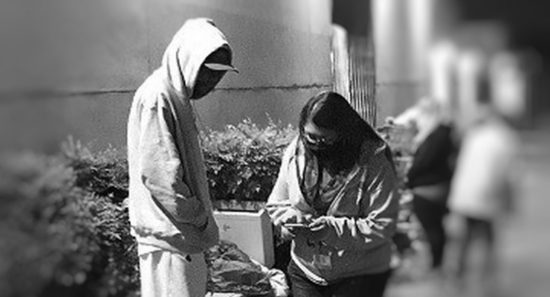 This is the fifth in series of columns on 10 Grand Challenges to transform Pasadena’s future. Today’s column focuses on rejecting Pasadena’s current planning effort to reduce homelessness and instead to mobilize the community to end homelessness in Pasadena.
This is the fifth in series of columns on 10 Grand Challenges to transform Pasadena’s future. Today’s column focuses on rejecting Pasadena’s current planning effort to reduce homelessness and instead to mobilize the community to end homelessness in Pasadena.
The homeless emergency in Southern California confronts Pasadena with a unique responsibility – and opportunity. Most of Los Angeles County falls under the jurisdiction of the LA Homeless Services Authority (LAHSA). But for the last thirty years, Pasadena has operated its own independent “Continuum of Care” known as the “Pasadena Partnership to End Homelessness.” Because of local efforts, spearheaded by non-profits like Union Station, Pasadena has been spared the dire symptoms of Skid Row and desolate encampments across Los Angeles. Yet for the unhoused on Pasadena’s streets, life is no less miserable here.
Last year’s “Point in Time” counted 512 homeless individuals on a chilly February night where the temperature dipped to 43 degrees. The annual count is conducted by volunteers who fanned out across the city to shine their flashlights into abandoned buildings, under bridges and overpasses, behind park bushes and down alleys. The most accurate portion of the count tallied 232 people in some form of temporary shelter, including short-term motel vouchers. Another 280 were estimated to be spending the night outdoors or sleeping in cars. Undoubtedly many of those were missed. Moreover, the number on that night represents only a single snapshot of the far larger number of people who fall into homelessness over the course of a year.
While “Ending Homelessness” is in their name, the Pasadena Partnership has lowered their sights for the next five years. They are currently drafting a plan with the goal of “developing clear goals and strategies grounded in evidence-based best practices to help reduce homelessness in the City.” That’s a tragic mistake.
Instead of settling for reducing homelessness, there is no doubt that Pasadena can effectively end homelessness in the next five years. Ending homelessness may seem unrealistic at the scale of the City of Los Angeles – although that is the stated goal of Mayor Karen Bass. Yet for a city as richly endowed as Pasadena, it is not only possible to provide adequate housing and services to ensure no one has to remain unhoused is not only possible, it is morally and economically inexcusable not to set that as our clear goal.
The people on our street are not alien strangers. According to last year’s survey, 71% were living in Pasadena when they lost their housing – having lived an average of 21 years in our community. Few of us could maintain our health or sanity living unhoused for a month. Yet for those seeking the elusive goal of finding permanent housing, the average length of time spent on the streets has grown to longer than three years. That’s 1,185 nights living hand to mouth, in constant fear and danger, without access to a shower or even a bathroom.
If hundreds of middle-class Pasadena residents were suddenly deprived of their homes by earthquake, fire or flood and the government left them homeless for three years, the entire City Council would be summarily recalled. Yet we tolerate the ongoing presence of people pushing shopping carts with everything they own or huddling under blankets in the doorway of a business seeking refuge from cold and rain.
Homelessness is not a natural disaster. It is a manmade disaster. It’s also preventable.
The Pasadena Partnership’s plan seeks “evidence-based best practices to help reduce homelessness.” They don’t have to look far. Perhaps the most successful model is called “Built for Zero.” Community Solutions is a national non-profit funded by major foundations to develop and test evidence-based best practices. You can find them here. Their best practices for ending homelessness are as simple as they are bold:
- Create a shared definition of success: Pasadena, like too many other cities, focuses on managing homelessness through outreach, referrals and as the Partnership Plan advocates, providing food, clothing, toiletries, laundry, and showers to the unhoused. Real success should be measured by driving the number of homelessness to “functional zero,” meaning it should be “rare, brief and non-recurring.”
- Assemble an accountable, community-wide team: Ever heard of “the Pasadena Partnership to End Homelessness”? Neither had I and I serve on the Planning Commission and teach a class on homelessness at Pepperdine University’s School of Public Policy. To end homelessness, the City, School District, Community College, businesses, churches, non-profits and neighborhood groups need to be working closely together, with a core team that meets weekly to track progress.
- Use real-time data, which accounts for everyone by name and need: Pasadena conducted the first ever annual Point in Time count in California back in 1993. But in 2023 we should be using daily information collected and shared with the consent of unhoused individuals where each person on the list has a file that includes their name, homeless history, health, and housing needs. The Federal government actually mandates such a database, but it is confined to non-profit service providers. Emergency responders, medical professionals, schools, law enforcement, transit agencies, libraries and every other entity encountering people experiencing homelessness needs to coordinate their efforts to help get people the services and housing they need.
- Center racial equity: while Black people make up just 8% of the population of Pasadena, they make up 34% of our homeless population. Unless we are prepared to confront Pasadena’s long history of racially-segregated housing and discrimination, we can’t get to the root of solving it.
- Target data-driven housing investments: Pasadena is without a local source of funding for fighting homelessness or providing affordable housing. We have many needs in our community, but none rank higher than ending the scourge of people living in misery on our streets. If Pasadena is truly “the center of the universe” as Mayor Victor Gordo proudly proclaims, it should be the center of solutions to this human catastrophe in our midst.
These five evidence-based best practices have produced remarkable results in scores of communities around America. Pasadena should get on board to end homelessness, not to tolerate and “manage” it. The longer we wait, the higher the cost in wasted tax dollars and devastated lives.
Rick Cole is a current Pasadena Planning Commissioner and a former Mayor of Pasadena. He serves as Chief Deputy Controller for the City of Los Angeles.














 2 comments
2 comments


